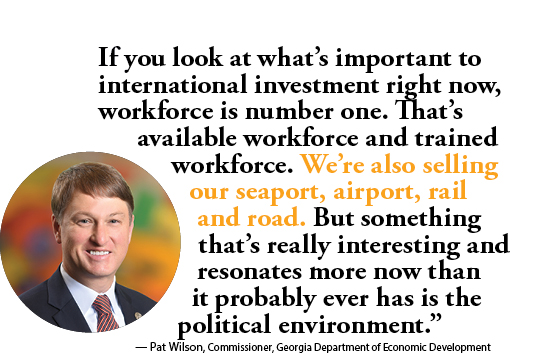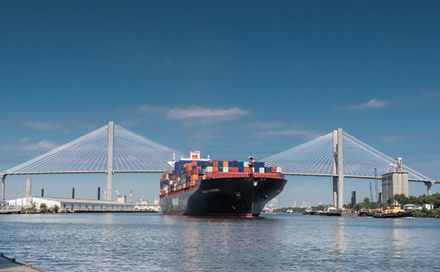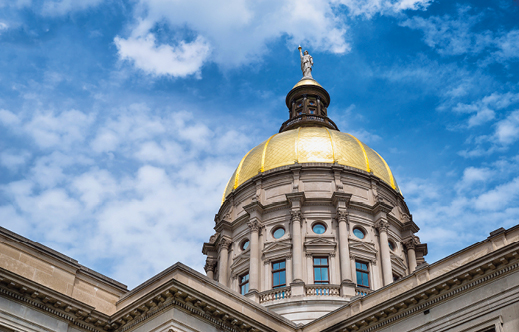Pat Wilson is recognized from one corner of Georgia to another as a stellar salesman for the state he has served under three successive governors. As longtime commissioner of the Georgia Department of Economic Development (GDEcD), Wilson is accessible and candid, always in the know and not afraid to drop the gloves to get projects done. He spoke with Site Selection in late January after returning from the World Economic Forum in Davos, Switzerland. His current boss, Gov. Brian Kemp, was the only U.S. governor there.
Site Selection: Governor Kemp just completed his second trip to Davos. When he goes there, it’s kind of an open field for him. What’s the value proposition that the governor and the Department see that that maybe other folks are missing?
Pat Wilson: You have basically every company that you would ever want to meet with sitting in the same area and you can cram 20 to 30 C-level meetings into a three-day trip. That’s what Davos is. You’re able to meet with practically any company in the world, meet at a very high level. We were the only state there selling. So, it’s a pretty fantastic opportunity for Governor Kemp to sit down with companies and say, “Why are you not in Georgia? What can we do to help you grow?”
It’s surprising that you’re the only ones there. When you talk to these international investors, what does your pitch sound like?
Wilson: It’s not very different than what we talk about with domestic investors. If you look at what’s important to international investment right now, workforce is number one. That’s available workforce and trained workforce. We’re also selling our seaport, airport, rail and road. But something that’s really interesting and resonates more now than it probably ever has is the political environment. In Georgia, regardless of political party, we have consistently been pro-business for the last 50 years, and companies that are looking at a 50-year investment love to talk about a track record. They appreciate that, whether Republican or Democrat, we have been very strong in supporting the business community.

By some accounts, Georgia is leading the nation in investments linked to the Inflation Reduction Act, much of it coming from South Korea. How has the state managed to position itself in such a way to gain all of that?
Wilson: We get this question a lot. But we started this transition a lot earlier than when the Inflation Reduction Act was passed and signed [August 16, 2022]. Hanwha Q Cells opened their facility in 2019. Hyundai selected Georgia before the IRA was passed. So we have this momentum going, and IRA has been like pouring gasoline onto a fire that was already smoldering. You have a significant amount of investment that has followed the money. But I think we had a leg up on a lot of the competition because we started early.
Gov. Kemp seems to have suggested in a recent interview that the window may be closing on some of these clean energy investments. Can you elaborate on that?
Wilson: You’ve got companies that are making generational investments, and they’re not going to continue to make them over and over again. There are only so many of them out there. What the governor is talking about is that we need to continue to be aggressive and identify sites and make sure that we are working these projects. Everyone in economic development needs to be prepared — including housing and utilities and infrastructure — because these projects only come once and if you lose out on that project, you’re not gonna get a second at-bat. It’s gone.
Another quote that came out of Davos was the governor saying Georgia is well on its way to achieving its goal, in the governor’s words, of being “the EV capital of the world.” What’s left to do to get there? And how concerned are you about the apparent slowdown in EV sales and competition from China, which is selling EVs cheaper?
Wilson: Let’s start at the end and work back. Competition from China is real. U.S. manufacturing is going to need to pick up, and that’s why continuing to talk to companies is important. If you talk to the Hyundais and Rivians and a lot of the other automakers, they’re doubling down. They’ve made a business decision that EV is where they’re going and they’re not holding back. The Hyundai plant in Bryan County is going to be producing a great product at a price point that sells into the U.S. market very well. No one’s looking at a slowdown. Their projections are strong and they’re still gaining market share. So, we’re going to continue to help the companies that are investing in Georgia to get where they want to go.
A recent workforce study gave a frank assessment of the I-16 corridor that’s to supply the Hyundai workforce into the future. What can you do to assure investors that Georgia has the workforce to continue to support these mega projects?
Wilson: If you asked me what keeps me up at night, that’s what keeps me up at night. It’s making sure that we not only have the skills needed, but the bodies that are needed. Georgia has got some real benefits. We’re still a very fast-growing state and we have the benefit of being able to attract talent. For a region like Savannah, recruitment opportunities are strong because it’s a great place to live.
When it comes to major projects in Georgia, is it time to update the notion that it’s Atlanta and Savannah and the rest?
Wilson: Atlanta and Savannah both have had amazing success. But if you look at counties with less than 50,000 people, which is how we kind of classify rural counties, we’ve had significant growth over the last five years. We’re seeing those jobs and those projects happen in literally every corner of the state. So, I would see your Atlanta and Savannah and raise you an entire state. It’s really exciting to see what is going on.
Higher & Higher

Photo: Getty Images
A defining feature of the Savannah skyline, the 33-year-old Talmadge Bridge is being raised to accommodate cargo vessels calling on the area’s ports. Shorter support cables, to be installed by 2028, will raise the 185-foot-tall structure by up to 30 feet, allowing passage of ever taller container ships.
The retrofit is considered to be a holding action ahead a long-term solution, either a new bridge or a tunnel beneath the Savannah River.

